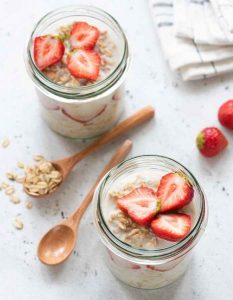Our hearts are the engines that keep our bodies running smoothly, pumping blood to nourish every cell and tissue. Maintaining a healthy heart is paramount for a long and fulfilling life. One of the key factors in heart health is our diet. What we eat can either promote or hinder the well-being of our cardiovascular system. In this article, we will explore a wide range of foods that are considered good for the heart, backed by scientific evidence and expert opinions. Whether you’re looking to prevent heart disease or improve your cardiovascular health, understanding these heart-healthy foods can be a vital step towards a healthier future.
Fatty Fish
Fatty fish like salmon, mackerel, sardines, and trout are rich in omega-3 fatty acids, particularly EPA (eicosapentaenoic acid) and DHA (docosahexaenoic acid). These essential fats are known to reduce inflammation, lower triglyceride levels, and reduce the risk of abnormal heart rhythms. They also help lower blood pressure and improve arterial function. The American Heart Association recommends eating fatty fish at least twice a week to support heart health.
Nuts
Nuts, including almonds, walnuts, pistachios, and hazelnuts, are packed with heart-healthy nutrients. They are rich in unsaturated fats, which can help lower bad cholesterol (LDL) levels and reduce the risk of heart disease. Nuts also contain fiber, antioxidants, and plant sterols that contribute to their heart-protective properties. However, it’s essential to consume them in moderation as they are calorie-dense.
Berries
Berries, such as strawberries, blueberries, raspberries, and blackberries, are packed with antioxidants, including flavonoids and polyphenols. These antioxidants help reduce oxidative stress and inflammation in the body, which are key contributors to heart disease. Berries are also high in fiber, which can aid in reducing cholesterol levels and improving heart health.
Leafy Greens
Dark leafy greens like spinach, kale, Swiss chard, and collard greens are excellent sources of vitamins, minerals, and fiber. They are particularly rich in potassium, which helps regulate blood pressure. Leafy greens are also low in calories, making them a great addition to a heart-healthy diet. Their high levels of nitrates may improve blood vessel function, reducing the risk of hypertension.
Whole Grains
Whole grains, such as oats, brown rice, quinoa, and whole wheat, are high in fiber, which is essential for heart health. Fiber helps lower LDL cholesterol levels, reduce blood pressure, and support healthy blood sugar levels. Consuming whole grains instead of refined grains can significantly reduce the risk of heart disease.
Avocado
Avocado is a unique fruit that’s exceptionally rich in heart-healthy monounsaturated fats. These fats help lower bad cholesterol levels and reduce the risk of heart disease. Avocados also provide potassium, which is crucial for maintaining healthy blood pressure. Incorporating avocados into your diet can be a delicious and heart-protective choice.
Olive Oil
Olive oil is a staple in the Mediterranean diet, known for its heart-protective benefits. It is rich in monounsaturated fats and antioxidants, including oleic acid and polyphenols. Regular consumption of olive oil has been associated with reduced inflammation, improved cholesterol profiles, and a lower risk of heart disease. Opt for extra virgin olive oil for the most significant health benefits.
Beans and Legumes
Beans and legumes, such as chickpeas, lentils, black beans, and kidney beans, are excellent sources of protein, fiber, and essential nutrients. They have a low glycemic index, which means they don’t cause rapid spikes in blood sugar levels. The soluble fiber in beans and legumes can help lower LDL cholesterol and reduce the risk of heart disease.
Garlic
Garlic has been used for centuries for its medicinal properties, including its potential to improve heart health. It contains allicin, a compound that has been shown to lower blood pressure and reduce cholesterol levels. Garlic may also have anti-inflammatory and antioxidant effects that benefit the cardiovascular system.
Dark Chocolate
Yes, you read it right – dark chocolate, in moderation, can be good for your heart. Dark chocolate with a high cocoa content (70% or higher) is rich in flavonoids, which have antioxidant properties. These flavonoids may help improve blood flow, lower blood pressure, and reduce the risk of heart disease. However, it’s crucial to enjoy dark chocolate in moderation due to its calorie content.
Tomatoes
Tomatoes are a rich source of lycopene, a powerful antioxidant that may reduce the risk of heart disease. Lycopene has been linked to improved cholesterol levels and a lower risk of stroke. Cooking tomatoes can actually increase the absorption of lycopene, so consider adding them to sauces and soups.
Green Tea
Green tea is packed with catechins, a type of antioxidant that has been shown to improve blood vessel function, lower blood pressure, and reduce cholesterol levels. Regular consumption of green tea may help lower the risk of heart disease. Drinking it unsweetened is the healthiest way to enjoy its benefits.
Red Wine
Moderate consumption of red wine has been associated with a reduced risk of heart disease. Red wine contains antioxidants, such as resveratrol, which may have protective effects on the cardiovascular system. However, it’s crucial to emphasize moderation – excessive alcohol consumption can have adverse health effects.
Fruits and Vegetables
A diet rich in a variety of fruits and vegetables provides essential vitamins, minerals, fiber, and antioxidants that support heart health. These foods can help reduce inflammation, lower blood pressure, and improve cholesterol profiles. Aim to fill half your plate with colorful fruits and vegetables for optimal heart benefits.
Flaxseeds and Chia Seeds
Flaxseeds and chia seeds are excellent sources of omega-3 fatty acids, fiber, and lignans, which are compounds that have antioxidant properties. Incorporating these seeds into your diet can help lower cholesterol levels, reduce blood pressure, and support overall heart health. You can add them to smoothies, yogurt, or oatmeal for a nutritious boost.
Pomegranates
Pomegranates are packed with antioxidants, particularly punicalagins and anthocyanins, which have been shown to improve heart health. They can help reduce blood pressure, lower cholesterol levels, and improve blood vessel function. Drinking pomegranate juice or consuming the seeds is a tasty way to reap these benefits.
Turmeric
Turmeric is a spice known for its anti-inflammatory properties, primarily due to its active compound, curcumin. Curcumin may help reduce the risk of heart disease by improving endothelial function, lowering inflammation, and reducing oxidative stress. Consider adding turmeric to your cooking or taking curcumin supplements for potential heart benefits.
Walnuts
Walnuts are a nutrient-dense nut that offers an array of heart-healthy benefits. They are rich in omega-3 fatty acids, antioxidants, and fiber. Regular consumption of walnuts has been linked to improved cholesterol levels, reduced inflammation, and enhanced blood vessel function.
Beetroot
Beetroot is a natural source of nitrates, which can help improve blood flow and lower blood pressure. Consuming beetroot or beetroot juice may be beneficial for individuals looking to support heart health.
Oats
Oats are a great source of soluble fiber, known as beta-glucans, which can help reduce LDL cholesterol levels and improve heart health. Starting your day with a bowl of oatmeal is an excellent way to incorporate oats into your diet.
Conclusion
A heart-healthy diet is a powerful tool for preventing heart disease and improving cardiovascular health. Incorporating these heart-healthy foods into your daily meals can go a long way in maintaining a strong and resilient heart. However, it’s essential to remember that a balanced diet is just one aspect of a heart-healthy lifestyle. Regular physical activity, stress management, and avoiding tobacco use are equally crucial for overall heart health. Consult with a healthcare professional or registered dietitian to create a personalized nutrition plan that suits your individual needs and preferences. With the right approach to diet and lifestyle, you can take significant steps towards a healthier heart and a longer, more fulfilling life.








